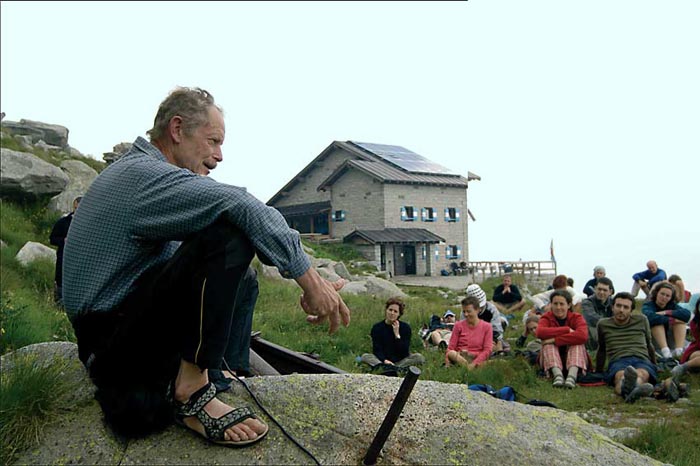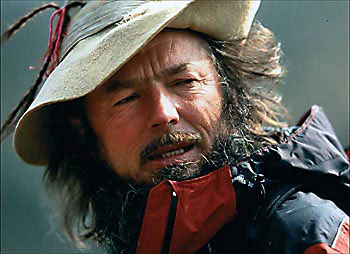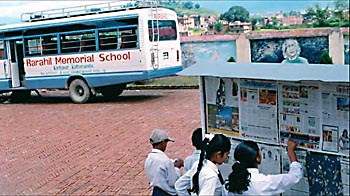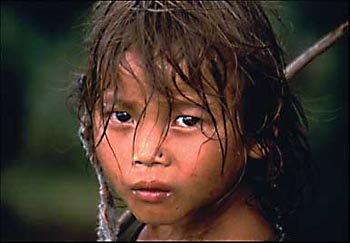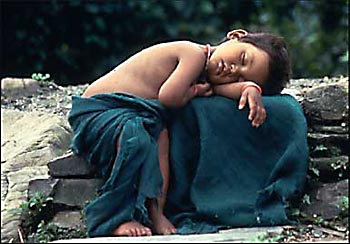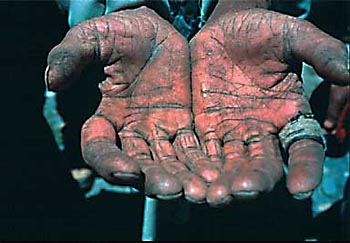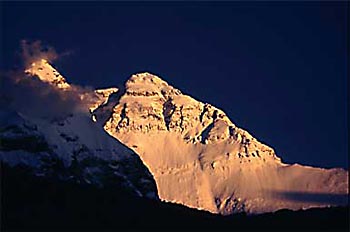|
THE ECHO OF PEACE
Erri de Luca, Rifugio Caré Alto, luglio
2005 e (a destra) Rovereto, Campana dei Caduti Dolomites of Peace, a project of communication
and cultural tourism promoted by Trentino Spa together with the
Foundation Opera Campana dei Caduti and the Trentino Peace Forum,
turns the mountain into the place for meditation and responsibility.
Eight events, from July 5th to August 16th, spent with the company
of journalists and experts, all committed actively in social issues,
both in Italy and abroad, and with the company of musicians, sharing
with them, maybe outside, sitting in the grass, the simplicity,
the thoughts, the meditations, the sounds that build a bridge between
different cultures, between the North and the South, the East and
the West. An initiative with a strong content, originated by a peace
message necessary today more than ever. Peace is, as a matter of
fact, the sole, true and essential assumption for the combination
development-democracy. As a product of several factors that must
interact among them, peace is the fruit of a fair political, economical,
cultural and institutional context. |
|
“I wander looking for oasises,
where thoughts and dreams walk side by side, I often would like
to grasp
Pupils read the news-paper
“Climbing as a symbol of Peace,
together with a professional school in Nepal is the most ambitiuos
goal to fulfill.”
Young girl comes back
from the fishing
|
CLIMBING AS A SYMBOL OF PEACE AN INTERVIEW WITH FAUSTO DE STEFANI by Mariapia Ciaghi
Fausto
De Stefani is one among the very few mountaineers in the world
to have climbed with no oxygen the 14 highest mountains on Earth.
What has meant and what does it mean to be a mountaineer for you? Growing up as a man and understanding always a bit more the sense of our existence. It has meant great tireness and unequal rewards, fear of not succeeding and efforts of will not to give in. In this process of growing up, what helped me even more, has been my nature-oriented soul, which has pushed me, more than the mountaineer challenge itself, beyond the known common paths. Being a mountaineer today means fulfilling our goals in the true respect both for the mountain or for its people.
It takes its origins from a mixture of information, suggestions, feelings, that grew out from the curiosity of childhood. How could I forget the tales so rich with charm and mystery told by my old ones around the fire, in the cold winter nights? One of those elderly men, with a long white beard, used to tell us of faraway places, seen from the above of a hot-air balloon, and indeed of different people. He would talk about noise and silence, of air and water, of open spaces and of boundless freedom that you could actually breathe. I have covered, with the hurry of youth, all the steps for mountaineers, facing mountains which are among the most demanding in the Alps and in the world; I have lived then fully the adventure of Himalayan peaks, that welcomed me.
Mountains should be considered the last realm of
silence and what they are today is a shining world of consumerism.
The echo is something that can be heard no matter
at what height. On the mountain it is stronger and in some situations
it propagates, with a great impact, from valley to valley.
We believe that professional competence can represent
an opportunity for social and economical redemption. The professional
school represents a further step for the support many children
in the community of Kirtipur, near Kathmandu, still need. In 2003, you took part to the making of the film by Carlo Pinelli, The Torquoise Horse... According to a very ancient legend, the big Asian river Amu Daya originates from the mouth of a turquoise horse, hidden on the highest top of the Afghan Palmir (or Hindu Kush). In order to reach that mysterious top, and to climb it as a symbol of peace, we entered the most remote and fascinating regions of Northern Afghanistan. It has been an adventure that put us in contact with the tragic reality of a country, exhausted by wars lasted for a quarter of a century. We’ve seen the devastations of an archeologic heritage of priceless value, but also the strong will of the local inhabitants for finding the way to civil coexistence. Maybe the time to bury kalashnikovs and digging out the ploug or... the axe has come.
For
further information and to give your contribuition to the project |
© 2006-2008 EcodelleDolomiti

